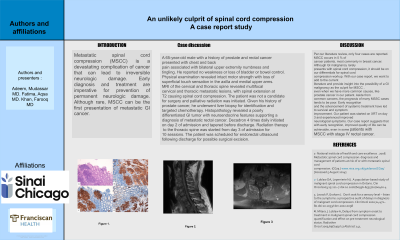Sunday Poster Session
Category: Colon
P0250 - An Unlikely Culprit of Metastatic Spinal Cord Compression
Sunday, October 22, 2023
3:30 PM - 7:00 PM PT
Location: Exhibit Hall

Has Audio

Aqsa Fatima, MD
Franciscan Health
Olympia Fields, IL
Presenting Author(s)
Aqsa Fatima, MD1, Farooq Khan, MD1, Mudassar Adeem, MD2
1Franciscan Health, Olympia Fields, IL; 2Mount Sinai Hospital, Chicago, IL
Introduction: Metastatic spinal cord compression (MSCC) is a devastating complication of cancer that can lead to irreversible neurologic damage. Early diagnosis and treatment are imperative for prevention of permanent neurologic damage. Although rare, MSCC can be the first presentation of metastatic GI cancer.
Case Description/Methods: Our patient is a 65 year old male with a history of prostate and rectal cancer who presented with chest and back pain associated with bilateral upper extremity numbness and tingling. He reported no weakness or loss of bladder or bowel control. Physical examination revealed intact motor strength with, loss of superficial touch sensation in the axillas and medial upper arms. MRI cervical and thoracic spine revealed multifocal cervical and thoracic metastatic lesions, with spinal extension at T2 causing spinal cord compression. The patient was not a candidate for surgery and palliative radiation was initiated. Given his history of prostate cancer, he underwent liver biopsy for identification and targeted chemotherapy. Histopathology revealed a poorly differentiated GI tumor with neuroendocrine features supporting a diagnosis of metastatic rectal cancer. Decadron 4 times daily day 2 of admission and tapered before discharge. Radiation therapy to the thoracic spine was started from day 3 of admission for 10 sessions. The patient was scheduled for endorectal ultrasound following discharge for possible surgical excision.
Discussion: Per our literature review, only four cases are reported. MSCC occurs in 5 % of cancer patients, most commonly in breast cancer. Although GI malignancy rarely presents with spinal cord compression, it should be on our differentials for spinal cord compression workup. With our case report, we want to add to the current literature and provide insight for the possibility of a GI malignancy as the culprit for MSCC even when we have more common causes, like prostate cancer in our patient. Aside from common cancers, the prognosis of many MSSC cases tends to be poor. Early recognition and the advancement of systemic treatment has led to survival and symptom improvement. Our patient was started on XRT on day 3 and experienced improvement in neurological symptoms. Our case report suggest that, with early recognition, improved quality of life can be achievable, even in some patients with MSCC with stage IV rectal cancer.
Disclosures:
Aqsa Fatima, MD1, Farooq Khan, MD1, Mudassar Adeem, MD2. P0250 - An Unlikely Culprit of Metastatic Spinal Cord Compression, ACG 2023 Annual Scientific Meeting Abstracts. Vancouver, BC, Canada: American College of Gastroenterology.
1Franciscan Health, Olympia Fields, IL; 2Mount Sinai Hospital, Chicago, IL
Introduction: Metastatic spinal cord compression (MSCC) is a devastating complication of cancer that can lead to irreversible neurologic damage. Early diagnosis and treatment are imperative for prevention of permanent neurologic damage. Although rare, MSCC can be the first presentation of metastatic GI cancer.
Case Description/Methods: Our patient is a 65 year old male with a history of prostate and rectal cancer who presented with chest and back pain associated with bilateral upper extremity numbness and tingling. He reported no weakness or loss of bladder or bowel control. Physical examination revealed intact motor strength with, loss of superficial touch sensation in the axillas and medial upper arms. MRI cervical and thoracic spine revealed multifocal cervical and thoracic metastatic lesions, with spinal extension at T2 causing spinal cord compression. The patient was not a candidate for surgery and palliative radiation was initiated. Given his history of prostate cancer, he underwent liver biopsy for identification and targeted chemotherapy. Histopathology revealed a poorly differentiated GI tumor with neuroendocrine features supporting a diagnosis of metastatic rectal cancer. Decadron 4 times daily day 2 of admission and tapered before discharge. Radiation therapy to the thoracic spine was started from day 3 of admission for 10 sessions. The patient was scheduled for endorectal ultrasound following discharge for possible surgical excision.
Discussion: Per our literature review, only four cases are reported. MSCC occurs in 5 % of cancer patients, most commonly in breast cancer. Although GI malignancy rarely presents with spinal cord compression, it should be on our differentials for spinal cord compression workup. With our case report, we want to add to the current literature and provide insight for the possibility of a GI malignancy as the culprit for MSCC even when we have more common causes, like prostate cancer in our patient. Aside from common cancers, the prognosis of many MSSC cases tends to be poor. Early recognition and the advancement of systemic treatment has led to survival and symptom improvement. Our patient was started on XRT on day 3 and experienced improvement in neurological symptoms. Our case report suggest that, with early recognition, improved quality of life can be achievable, even in some patients with MSCC with stage IV rectal cancer.
Disclosures:
Aqsa Fatima indicated no relevant financial relationships.
Farooq Khan indicated no relevant financial relationships.
Mudassar Adeem indicated no relevant financial relationships.
Aqsa Fatima, MD1, Farooq Khan, MD1, Mudassar Adeem, MD2. P0250 - An Unlikely Culprit of Metastatic Spinal Cord Compression, ACG 2023 Annual Scientific Meeting Abstracts. Vancouver, BC, Canada: American College of Gastroenterology.
